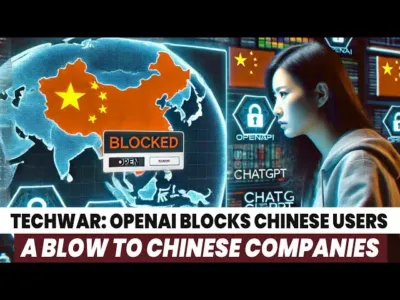OpenAI Blocks Access to China, Marking a New Phase in Global Tech Rivalry

OpenAI‘s Bold Move Amidst Rising Tensions
This week, OpenAI has decisively blocked access to its site from mainland China and Hong Kong, effectively cutting off developers and companies in these regions from some of the most advanced AI technologies available today. Given the escalating geopolitical tensions and technology rivalry, OpenAI’s move is not entirely unexpected. However, it marks a significant inflection point in the AI sector, intensifying the ongoing tech cold war. The repercussions of this decision will be far-reaching, affecting the AI landscape in China and worldwide, and laying the groundwork for fierce future competition among AI superpowers.
Geopolitical and Strategic Implications
OpenAI’s decision to block access comes in response to increased governmental demands and a heightened rivalry for AI dominance. This move is seen as a strategic measure to protect the company’s intellectual property while navigating complex geopolitical challenges. It highlights the growing digital divide between China and Western countries, a defining element of the current tech war era. According to some experts, this action also signifies a broader trend of tech decoupling, with the US and Chinese tech ecosystems increasingly diverging.
Implications for Chinese AI Companies
Challenges and Opportunities for Chinese AI Players
The blockade by OpenAI presents both challenges and opportunities for Chinese AI companies. The absence of advanced models like GPT-4 in the Chinese market could hinder the adoption and integration of cutting-edge AI technologies, particularly for startups and smaller companies that lack the resources to develop similar models independently. A report from the South China Morning Post, citing experts, indicates that this move, which goes into effect on July 9, could significantly impact Chinese companies that rely on OpenAI’s large language models (LLMs) to develop their services.
Potential for Increased Domestic Innovation
Despite the challenges, OpenAI’s blockade could also serve as a catalyst for innovation within China. It might drive Chinese companies to further develop their technologies, potentially sparking a new AI research boom and fostering a more self-sufficient and energetic AI landscape. Domestic giants like Alibaba, Baidu, and Tencent are well-positioned to fill the vacuum created by OpenAI’s absence, given their financial resources, talent, and infrastructure. This could lead to increased AI research and development efforts, resulting in the creation of homegrown alternatives to OpenAI’s technologies.
Government Support and Competitive Landscape
The Chinese government has been aggressively funding its tech industry with significant investments and favorable regulations. This support could lead to a surge in AI research, increasing competition among domestic players and bringing China closer to its overseas counterparts. The new rush of AI research driven by this blockade might strengthen China’s position in the global AI landscape.

OpenAI-Block-Access-to-China
Global AI Dynamics
Impact on the Global AI Landscape
OpenAI’s decision has ramifications beyond China, potentially shifting global AI dynamics. This move could lead to a more fragmented AI landscape, with countries and regions aligning themselves based on access to AI technologies. Southeast Asia and African countries, which have strong economic ties with China, might favor Chinese AI solutions, while European and North American states could increase their dependence on American-based AI technologies. This split could have profound implications for international consortia, data exchanges, and the evolution of global AI norms.
Ethics and Security Concerns
The blockade also raises important questions regarding ethics and security. OpenAI is exercising digital sovereignty, controlling who can benefit from its technology. This action is part of a broader clampdown across the AI sector to ensure that technologies are developed and deployed in ways that meet ethical and security standards. As the AI race intensifies, it is crucial to prioritize ethics and international collaboration. Companies that view China as an essential market will need to navigate the complex geopolitical landscape to continue their operations.
Navigating Geopolitical Challenges
For example, Apple is reportedly seeking local partners to provide services that comply with Beijing’s stringent AI regulations, including standards set by the China Electronic Standardization Institute last year. Ultimately, the future of AI depends not only on technological advancements but also on the geopolitical strategies and policies governing its development and deployment.
Check out the other AI news and technology events right here in AIfuturize!



